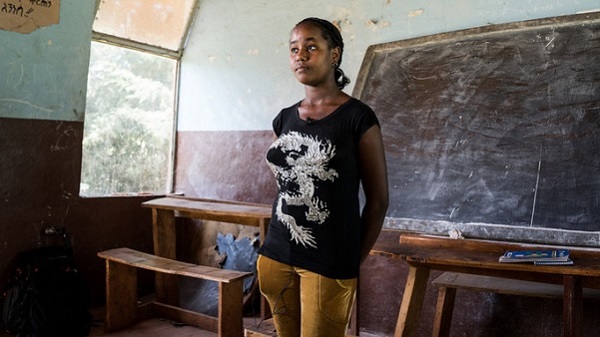
As part of its endeavors to ensure the health and wellbeing of its people, including women and children, Ethiopia has committed to eliminate female genital mutilation (FGM) and early marriage by 2025. In line with this, the Ministry of Health banned medicalization of FGM in all public and private medical facilities in the country. As per the circular passed on 4 January 2017, medical personnel who engage in any form of FGM in medical facilities will be subjected to legal action.
The circular was passed following a one-day national consultation that brought together representatives from all regional health bureaus, government and non-governmental organizations, the academic and scientific community, house of peoples’ representatives and religious leaders to discuss on the adverse effects of FGM. Presentations on the procedure and adverse outcomes of FGM were made during the consultation, leading to an unanimous call to step up efforts to prevent and end this harmful practice.
Female genital mutilation, a violation of the human rights of girls and women, comprises all procedures that involve partial or total removal of the external female genitalia, or other injury to the female genital organs for non-medical reasons. FGM is mostly carried out on young girls between infancy and age 15. According to a 2016 UNICEF report (Female Genital Mutilation/Cutting: A Global Concern), more than 200 million girls and women alive today have been cut in 30 countries in Africa, the Middle East and Asia where FGM is concentrated.
The practice is mostly carried out by traditional circumcisers, who often play other central roles in communities, such as attending childbirths. In many settings, health care providers perform FGM in the erroneous belief that the procedure is safer and acceptable when qualified health professionals perform it – that is, medicalization of FGM. However, medicalization of FGM goes against the “do no harm” principle in health professionals ethics, which prohibits the practice; medicalization of FGM is unacceptable.
In recent years, there has been a dramatic increase in the proportion of FGM operations carried out by trained health-care personnel. The World Health Organization (WHO) is strongly opposed to health care providers carrying out FGM, as it normalizes and condones the practice, hindering long term efforts for eliminating FGM.
WHO’s efforts to end FGM include:
- strengthening the health sector response: providing guidelines, training and policy to ensure that health professionals can provide medical care and counselling to girls and women living with female genital mutilation;
- building evidence: generating knowledge about the causes and consequences of the practice, how to eliminate it, and how to care for those who have experienced female genital mutilation;
- increasing advocacy: developing publications and advocacy tools for international, regional and local efforts to end female genital mutilation within a generation.
The WHO Ethiopia Country Office provides technical support to the Ministry of Health and works with partners such as UNICEF, UNFPA and UNWOMEN towards achievement of the country’s goal to end FGM by 2025.
Source: WHO Africa
——
Other stories:
- Ending Child Marriage and FGM in Ethiopia
- U.S. Embassy Chargé d’Affaires Peter Vrooman Visited the Cure Hospital
- Zambian President to Host Meeting in Ethiopia on Ending Child Marriage
- Bogaletch Gebre: Almost All Girls Were Cut in Her Ethiopian Village. Not Anymore, Thanks to Her.
